Social Media Day was celebrated in Portugal on 30 June 2023. The Portuguese Safer Internet Centre, aware of the peculiarities of these platforms, developed the In[sight] campaign to make people aware of some widely used terms and acronyms.

Sometimes, messages are hard to decipher because they contain a word we don't know or an acronym we've never seen before, like FOMO, catfish or sharebait.
With this in mind, the campaign was developed to shed some light on these terminologies and has collected some terms, foreign words and acronyms to raise awareness of them as they are prevalent, especially on social media. Read on to discover their meanings.
Clickbait
It is a well-known term that refers to content that entices people to click on a link or other web content.
Sharebait
It is a post on social media whose main purpose is to get other users to share the post in order to get as much attention, reach and engagement as possible.
Finsta
Fake Instagram is a kind of second Instagram account created for users to post exactly what they want more privately.
Cancel culture
It encourages people to stop supporting personalities or organisations because of a mistake or reprehensible behaviour. This movement creates discussions about issues such as racism, homophobia, xenophobia, and others. While it is important to discuss these issues, attacks can promote and spread hate speech and negatively impact the lives of those who have been cancelled.
FOMO
The Fear Of Missing Out is the fear of not being included in an activity that others find interesting or enjoyable or of missing important opportunities. It usually causes feelings of discomfort, dissatisfaction, stress, and even depression. Increased use of social networking sites promotes the existence of FOMO, and the younger population is most affected because they are constantly comparing their lives to the experiences of others they see online.
Red flag
It refers to a certain behaviour that is considered unpleasant or dangerous and can cause problems, and it is oftentimes linked to behaviours in the dating/relationships sphere.
Stalker
It is a person who follows someone obsessively and aggressively to the point of harassment.
Stalking/persistent harassment is aimed at making the victim feel insecure, frightened, and anxious. Usually, these behaviours start out subtle and, in some ways, harmless or even flattering or courting to "win over" the victim, but they can go beyond that if the perpetrator realises the victim is not interested. Learn more about some of the behaviours here.
Stan
A stan is a combination of "stalker" and "fan”, meaning the person is obsessed with someone or something, but not in a sinister way.
Deepfake
It is a technology that uses artificial intelligence to create fake videos of people doing something they never did. This technique has already produced everything from pornographic content from celebrities to fictional speeches from politicians.
Cheapfake
It is a term that, unlike deepfake, encompasses a variety of digital manipulation techniques that don't use artificial intelligence. Cheapfakes use more conventional methods, such as photo editing, filters, selective editing, changing the speed or tone in which the content was produced, and others.
Ghosting
It is when someone cuts off all online communication with another person without explanation, especially in the dating/relationship sphere. This practice is not new, but social media has made it increasingly common. Ghosting can threaten self-esteem and self-confidence and is closely linked to the way we see the world.
Leak
A leak is the unauthorised dissemination of information or content on the internet.
Troll
It is a person who intentionally posts inflammatory or offensive comments or other provocative content to anger, attract attention, or cause trouble.
This campaign, as mentioned, was presented on the Safer Internet Centre's social media platforms during June and July and reached 25,797 people. Below are other examples of terms and acronyms you will most likely encounter on social media.
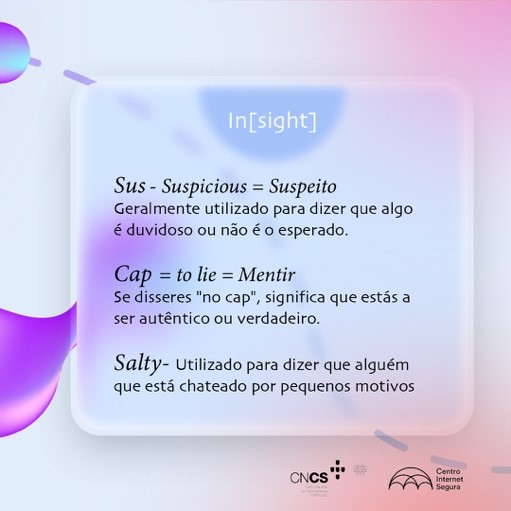
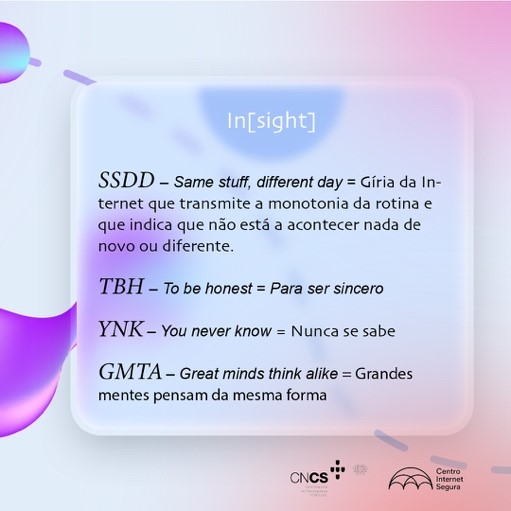
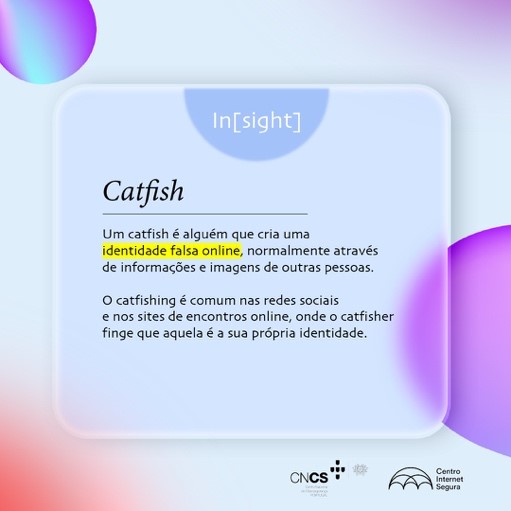
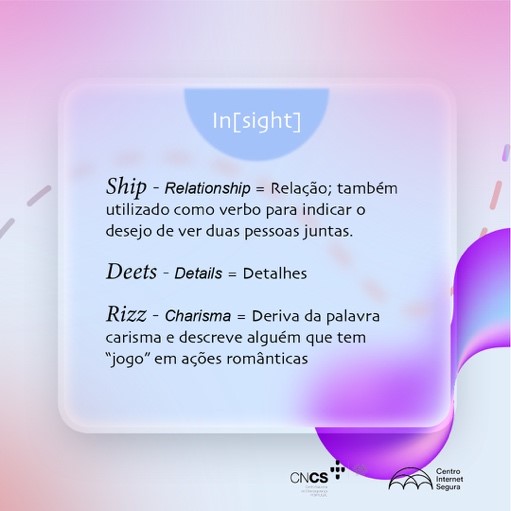
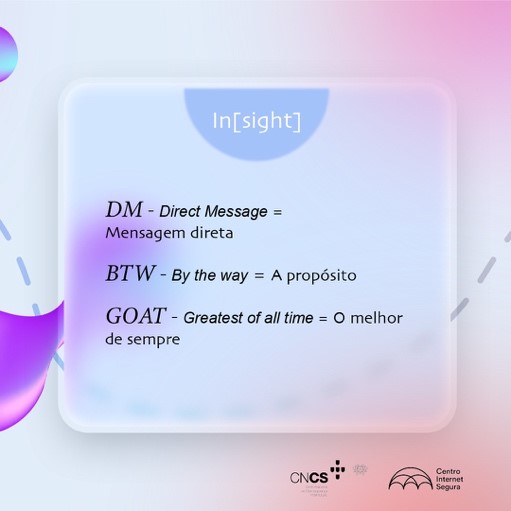
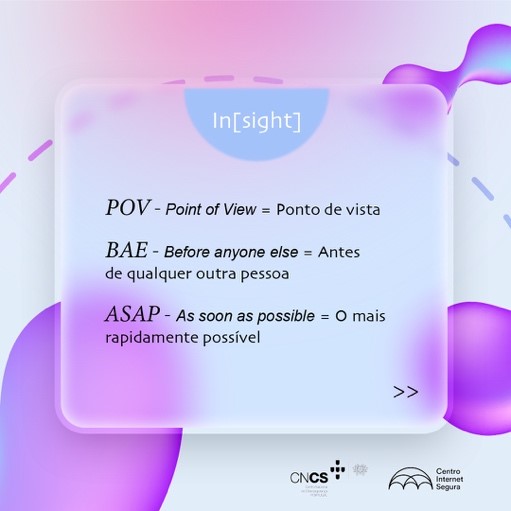
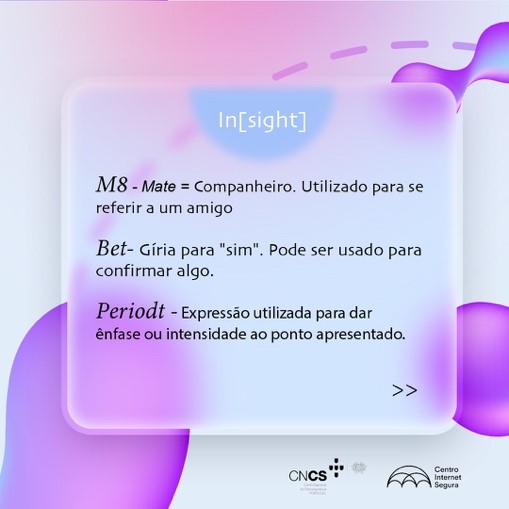
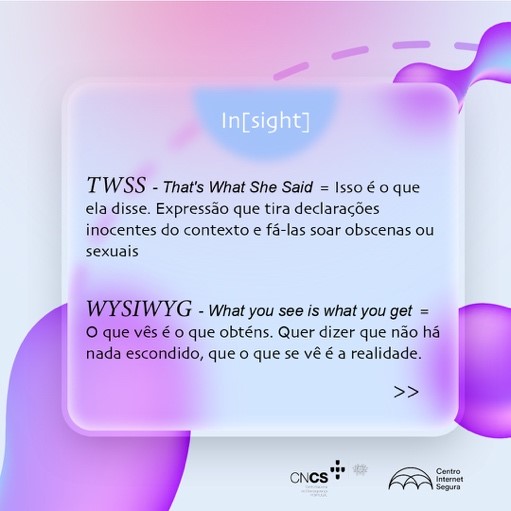
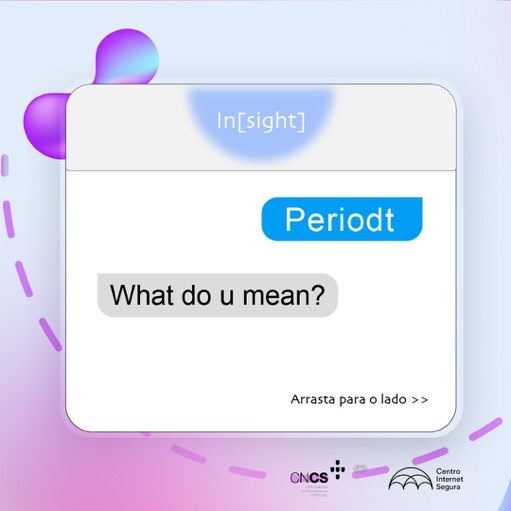
Credits: Portuguese Safer Internet Centre
Find out more about the work of the Portuguese Safer Internet Centre, including its awareness raising, helpline, hotline and youth participation services – or find similar information for Safer Internet Centres throughout Europe.
Social Media Day was celebrated in Portugal on 30 June 2023. The Portuguese Safer Internet Centre, aware of the peculiarities of these platforms, developed the In[sight] campaign to make people aware of some widely used terms and acronyms.

Sometimes, messages are hard to decipher because they contain a word we don't know or an acronym we've never seen before, like FOMO, catfish or sharebait.
With this in mind, the campaign was developed to shed some light on these terminologies and has collected some terms, foreign words and acronyms to raise awareness of them as they are prevalent, especially on social media. Read on to discover their meanings.
Clickbait
It is a well-known term that refers to content that entices people to click on a link or other web content.
Sharebait
It is a post on social media whose main purpose is to get other users to share the post in order to get as much attention, reach and engagement as possible.
Finsta
Fake Instagram is a kind of second Instagram account created for users to post exactly what they want more privately.
Cancel culture
It encourages people to stop supporting personalities or organisations because of a mistake or reprehensible behaviour. This movement creates discussions about issues such as racism, homophobia, xenophobia, and others. While it is important to discuss these issues, attacks can promote and spread hate speech and negatively impact the lives of those who have been cancelled.
FOMO
The Fear Of Missing Out is the fear of not being included in an activity that others find interesting or enjoyable or of missing important opportunities. It usually causes feelings of discomfort, dissatisfaction, stress, and even depression. Increased use of social networking sites promotes the existence of FOMO, and the younger population is most affected because they are constantly comparing their lives to the experiences of others they see online.
Red flag
It refers to a certain behaviour that is considered unpleasant or dangerous and can cause problems, and it is oftentimes linked to behaviours in the dating/relationships sphere.
Stalker
It is a person who follows someone obsessively and aggressively to the point of harassment.
Stalking/persistent harassment is aimed at making the victim feel insecure, frightened, and anxious. Usually, these behaviours start out subtle and, in some ways, harmless or even flattering or courting to "win over" the victim, but they can go beyond that if the perpetrator realises the victim is not interested. Learn more about some of the behaviours here.
Stan
A stan is a combination of "stalker" and "fan”, meaning the person is obsessed with someone or something, but not in a sinister way.
Deepfake
It is a technology that uses artificial intelligence to create fake videos of people doing something they never did. This technique has already produced everything from pornographic content from celebrities to fictional speeches from politicians.
Cheapfake
It is a term that, unlike deepfake, encompasses a variety of digital manipulation techniques that don't use artificial intelligence. Cheapfakes use more conventional methods, such as photo editing, filters, selective editing, changing the speed or tone in which the content was produced, and others.
Ghosting
It is when someone cuts off all online communication with another person without explanation, especially in the dating/relationship sphere. This practice is not new, but social media has made it increasingly common. Ghosting can threaten self-esteem and self-confidence and is closely linked to the way we see the world.
Leak
A leak is the unauthorised dissemination of information or content on the internet.
Troll
It is a person who intentionally posts inflammatory or offensive comments or other provocative content to anger, attract attention, or cause trouble.
This campaign, as mentioned, was presented on the Safer Internet Centre's social media platforms during June and July and reached 25,797 people. Below are other examples of terms and acronyms you will most likely encounter on social media.









Credits: Portuguese Safer Internet Centre
Find out more about the work of the Portuguese Safer Internet Centre, including its awareness raising, helpline, hotline and youth participation services – or find similar information for Safer Internet Centres throughout Europe.
- < Previous article
- Next article >











